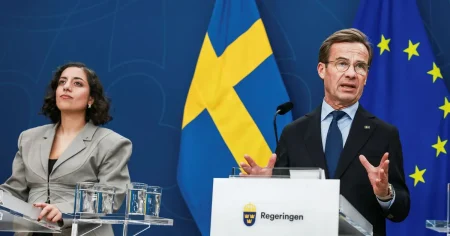The introduction of Sweden’s anonymous witness law, aimed at combating gang violence, has been met with both cautious optimism and serious concern. Brottsofferjouren, the Swedish Crime Victim Support organization, acknowledges the law’s potential as a valuable tool, but emphasizes the crucial need for clear and accurate communication surrounding its implementation. A core concern revolves around managing expectations for those involved in legal proceedings. The organization fears that misunderstandings about the law’s scope could lead to disappointment and further erode trust in the justice system. This concern stems from the recognition that even under current systems, a significant proportion of individuals express dissatisfaction with their experiences in legal processes, often stating they would not participate again.
A key incident highlighting the communication challenges surrounding the new law involved a now-deleted Instagram post by Energy and Business Minister Ebba Busch. The post erroneously claimed that victims of crime could now testify anonymously, a statement that contradicts the law’s provisions. The law, which came into effect on January 1, 2024, only allows for witness anonymity under very specific circumstances. These include a demonstrable risk of serious reprisal against the witness or their close relations, an alleged crime carrying a minimum two-year prison sentence, and the inadequacy of other protective measures. Furthermore, the law explicitly excludes victims (målsägande) from anonymity provisions. This misrepresentation prompted swift criticism and concern, particularly from Brottsofferjouren, who labelled the minister’s post ”remarkable” and ”unnecessary.”
The miscommunication surrounding the anonymous witness law carries significant implications for the very individuals the law aims to protect. Brottsofferjouren argues that inaccurate information can create false hope and ultimately lead to disillusionment among potential witnesses and crime victims. This risk is compounded by pre-existing challenges within the justice system, where a notable number of participants already express dissatisfaction with their experiences. The organization stresses the importance of accurate information dissemination to avoid further exacerbating these issues. The incident underscores the need for a comprehensive communication strategy from the government to ensure that the law’s complexities and limitations are clearly understood by the public and especially by potential witnesses.
The organization’s Generalsekreterare, Fredrik Mellqvist, highlights the critical importance of managing expectations from the outset. He argues that misinformation, especially from government officials, can have a detrimental effect on public trust and the willingness of individuals to cooperate with legal processes. Mellqvist further emphasizes the urgency of correcting the misinformation spread by Minister Busch’s Instagram post, advocating for a clarification to be published through the same channels to reach the same audience. This, he suggests, is vital to mitigate the potential damage caused by the initial inaccurate statement. He stresses the government’s responsibility to prioritize clear communication regarding the law, particularly given its sensitive nature and potential impact on vulnerable individuals.
The core provisions of the anonymous witness law necessitate a cautious and nuanced approach. The criteria for granting anonymity highlight the gravity of the situations in which the law is intended to apply. The requirement of a demonstrable risk of serious reprisal, coupled with the stipulation of a minimum two-year prison sentence for the alleged crime, underscores the law’s focus on serious offenses and the genuine threats faced by potential witnesses. The additional requirement that alternative protective measures be deemed insufficient further emphasizes the law’s role as a last resort, reserved for cases where conventional safeguards are inadequate.
The controversy surrounding Minister Busch’s Instagram post serves as a stark reminder of the complexities involved in introducing new legal measures, particularly those concerning sensitive issues like witness protection. The incident underscores the crucial role of clear and accurate communication in ensuring that such laws are understood and applied effectively. The concerns raised by Brottsofferjouren, coupled with the swift public reaction to the minister’s post, highlight the need for a proactive approach to public education regarding the anonymous witness law. This includes addressing not only the law’s provisions but also the potential limitations and the specific circumstances under which it can be applied. The goal should be to foster realistic expectations and ensure that the law serves its intended purpose of protecting witnesses and facilitating the prosecution of serious crimes, without inadvertently undermining public trust in the justice system.














